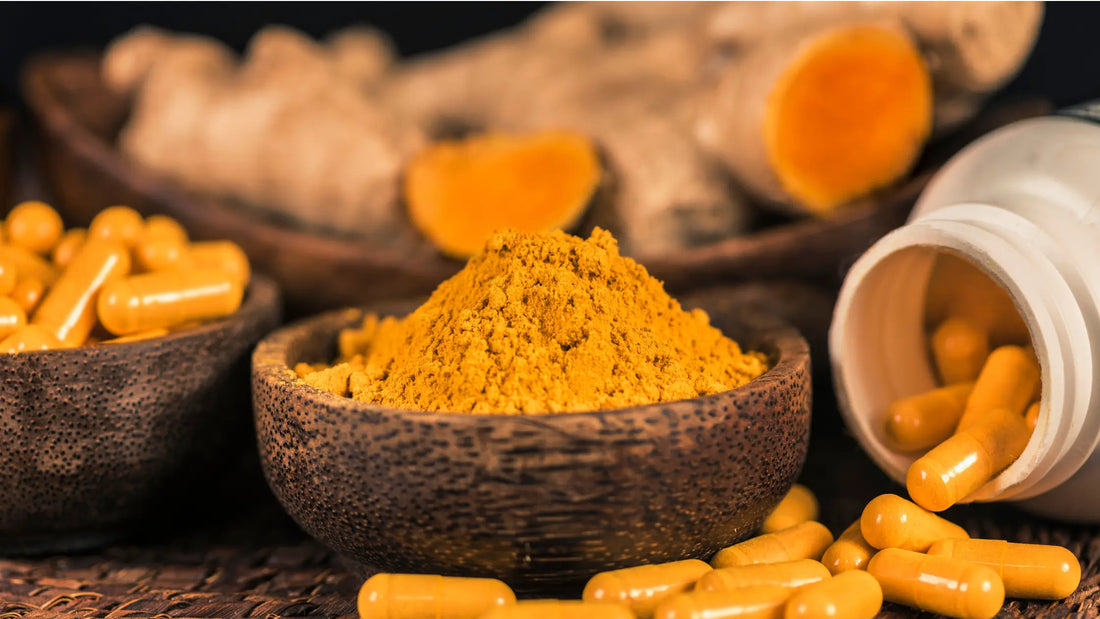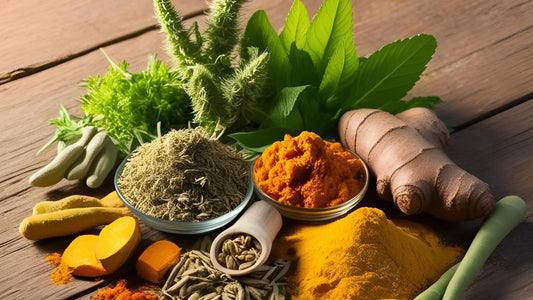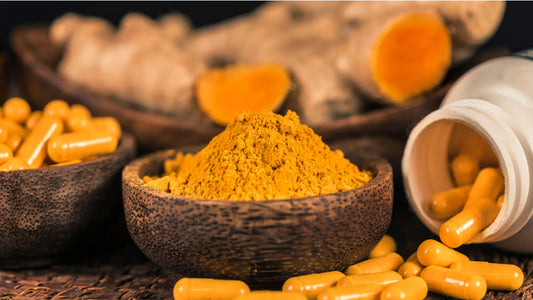
Health Benefits of Curcumin Supplements and Their Side Effects
Turmeric, known for its vibrant yellow color, has been celebrated for centuries in traditional medicine for its health-boosting properties. The active compound within turmeric, curcumin, is responsible for many of these benefits and has been the subject of modern scientific research. With the rise of health-conscious consumers, turmeric curcumin supplements have gained popularity as a convenient way to include this powerful compound in daily routines. These supplements are known for their potent antioxidant and anti-inflammatory effects, making them a natural choice for individuals seeking to improve their overall wellness.
In this blog, we will examine the health benefits of curcumin supplements in detail, including their positive effects on heart health, cognitive function, joint health, and more. We will also discuss the potential side effects of turmeric curcumin supplements, helping you understand both the advantages and possible risks associated with their use. From improving cardiovascular health to supporting the body’s natural anti-inflammatory responses, curcumin for heart health and its ability to protect against oxidative stress are key areas we will cover. Additionally, we’ll delve into how curcumin supplements contribute to digestive health and alleviate discomfort in inflammatory conditions. By the end of this blog, you will have a comprehensive understanding of why curcumin supplements are becoming an essential part of many wellness routines.
What Are Turmeric Curcumin Supplements?
Turmeric curcumin supplements are concentrated forms of curcumin, the active compound found in the turmeric root (Curcuma longa). Curcumin gives turmeric its characteristic yellow color and is responsible for many of its health-promoting properties. While turmeric has been used for centuries in traditional medicine, its bioactive compound, curcumin, has garnered significant attention in modern science due to its antioxidant, anti-inflammatory, and antimicrobial properties.
Turmeric curcumin supplements typically come in capsule, tablet, or powder form and are often combined with black pepper extract (piperine) to enhance the absorption of curcumin in the body. Curcumin on its own has low bioavailability, meaning that it’s not easily absorbed. Piperine helps increase the absorption rate, allowing the body to benefit from curcumin more effectively.
Benefits of Taking Turmeric Curcumin Supplements
The health benefits of curcumin supplements are numerous and well-documented. Here are some of the most notable benefits that can have a positive impact on your well-being:
1. Curcumin for Heart Health
One of the key benefits of turmeric curcumin supplements is their ability to improve heart health. Curcumin has been shown to enhance the function of the endothelium, the lining of the blood vessels, which plays a crucial role in regulating blood pressure, blood clotting, and overall cardiovascular health.
Research suggests that curcumin for heart health may help reduce the risk of heart disease by improving endothelial function and reducing inflammation. Curcumin has also been linked to improved cholesterol levels by increasing HDL (good cholesterol) and reducing LDL (bad cholesterol). Additionally, its anti-inflammatory properties help protect against the chronic inflammation that is often associated with heart disease.
2. Curcumin Supplements for Antioxidant Protection
Curcumin is a potent antioxidant, which means it helps neutralize harmful free radicals in the body. Free radicals are unstable molecules that can cause oxidative stress and damage to cells, leading to aging and the development of various chronic diseases, including cancer, diabetes, and Alzheimer’s disease.
By taking curcumin supplements for antioxidant protection, individuals can significantly boost their body’s ability to fight oxidative stress. The antioxidant properties of curcumin also protect cells from damage and improve overall immune function, promoting long-term health and wellness.
3. Anti-inflammatory Effects of Curcumin
Inflammation is a natural response by the body’s immune system to injury or infection. However, chronic inflammation is linked to a variety of diseases, including arthritis, heart disease, diabetes, and autoimmune disorders. One of the most well-known benefits of turmeric curcumin supplements is their ability to reduce inflammation.
The anti-inflammatory effects of curcumin are potent and can help alleviate symptoms of inflammatory conditions such as osteoarthritis, rheumatoid arthritis, and inflammatory bowel disease (IBD). Curcumin works by blocking inflammatory molecules, including cytokines and enzymes, which play a role in the body’s inflammatory response. By reducing inflammation, curcumin helps alleviate pain, stiffness, and swelling, leading to better joint mobility and a better quality of life for individuals dealing with chronic inflammation.
4. Supports Brain Health and Cognitive Function
Curcumin also offers significant benefits for brain health and cognitive function. Studies have shown that curcumin can boost levels of brain-derived neurotrophic factor (BDNF), a protein that supports the growth and maintenance of brain cells. BDNF plays a vital role in memory, learning, and mood regulation.
Curcumin for brain health is particularly beneficial for individuals dealing with age-related cognitive decline or conditions like depression. Research suggests that curcumin may help reduce the risk of neurodegenerative diseases such as Alzheimer’s and Parkinson’s by protecting brain cells from oxidative stress and promoting neuronal growth and repair.
5. Promotes Joint Health and Mobility
For individuals suffering from joint pain, stiffness, or arthritis, turmeric curcumin supplements can offer significant relief. Curcumin supplements are known for their ability to reduce joint inflammation, helping to alleviate the pain and swelling that are commonly associated with conditions like osteoarthritis and rheumatoid arthritis.
By including turmeric curcumin supplements in your routine, you may experience improved joint mobility, increased flexibility, and reduced discomfort. This is especially important for those who rely on physical activity for their overall health and well-being.
6. Supports Digestive Health
Curcumin also provides benefits for the digestive system. It can help reduce symptoms of indigestion, bloating, and gas, all of which are common digestive complaints. The anti-inflammatory effects of curcumin help soothe the lining of the digestive tract, which can reduce discomfort and promote better digestion.
In addition, curcumin may aid in the treatment of irritable bowel syndrome (IBS) and other gastrointestinal conditions by promoting the secretion of bile, which is essential for the digestion of fats. Its ability to reduce inflammation also benefits individuals with inflammatory digestive disorders such as Crohn’s disease and ulcerative colitis.
Side Effects of Turmeric Curcumin Supplements
While turmeric curcumin supplements are generally safe for most people, it’s important to be aware of potential side effects, especially when taken in high doses. Some individuals may experience the following:
1. Gastrointestinal Issues
High doses of curcumin can sometimes cause stomach discomfort, bloating, or diarrhea. If you experience these symptoms, it’s recommended to lower your dose or take the supplement with food to minimize irritation.
2. Blood Thinning
Curcumin has mild blood-thinning effects, which could interfere with blood clotting. This is particularly important for individuals who are on anticoagulant medications or those preparing for surgery. It’s best to consult with a healthcare provider before using curcumin supplements if you fall into these categories.
3. Interactions with Medications
Turmeric curcumin supplements may interact with certain medications, including those for diabetes, blood pressure, and chemotherapy. If you are on prescription medications, always consult a healthcare professional before adding curcumin to your regimen.
Conclusion
The health benefits of curcumin supplements are extensive and include improving heart health, providing antioxidant protection, reducing inflammation, promoting joint and digestive health, and supporting cognitive function. Curcumin’s powerful properties make it a popular supplement for those seeking a natural way to enhance their health and well-being.
However, it’s important to be mindful of the potential side effects of turmeric curcumin supplements, particularly if you are on medications or have underlying health conditions. Before including curcumin in your daily routine, it’s always best to consult a healthcare provider to ensure it’s the right supplement for you.
By understanding both the benefits and potential risks of turmeric curcumin supplements, you can make an informed decision about how this supplement may fit into your lifestyle. Whether you’re looking to boost heart health, reduce inflammation, or protect your brain, curcumin may be a valuable addition to your wellness routine.
FAQs
1. What is Curcumin?
Curcumin is a naturally occurring compound found in turmeric, the spice commonly used in cooking. It is known for its powerful antioxidant and anti-inflammatory properties. Curcumin is considered the active ingredient responsible for many of turmeric's health benefits, which include promoting joint health, reducing inflammation, and supporting digestive wellness.
2. What are the benefits of curcumin supplements?
Curcumin supplements provide a wide range of health benefits, including reducing inflammation, improving joint mobility, supporting heart health, and enhancing cognitive function. Curcumin is also known for its antioxidant properties, helping to fight oxidative stress and protect cells from damage. These benefits make curcumin a popular supplement for people seeking natural solutions for chronic conditions.
3. Are curcumin and turmeric the same?
No, curcumin and turmeric are not the same. Turmeric is a root plant, and curcumin is the main bioactive compound found within turmeric. While turmeric contains curcumin, it also includes other compounds. Curcumin supplements provide a more concentrated dose of this beneficial compound for targeted health benefits, such as reducing joint pain and boosting cognitive function.
4. Is turmeric good for health?
Yes, turmeric is highly beneficial for health, primarily because of its curcumin content. Turmeric is known for its ability to reduce inflammation, improve digestion, and support immune health. Consuming turmeric regularly may also lower the risk of chronic diseases, including heart disease, diabetes, and certain types of cancer.
5. Is it good to take curcumin daily?
Yes, taking curcumin daily can be beneficial for supporting overall health. Its anti-inflammatory and antioxidant properties may help with joint pain, heart health, and cognitive function. However, it’s important to follow the recommended dosage and consult with a healthcare provider, especially if you have underlying health conditions or are taking medications.
6. Which turmeric has the highest curcumin?
The Curcuma longa variety of turmeric contains the highest concentration of curcumin. For those seeking maximum curcumin benefits, turmeric supplements or extracts standardized to contain 95% curcumin offer the highest potency. These products provide more curcumin than regular turmeric powder used in cooking.



